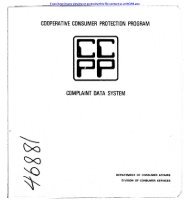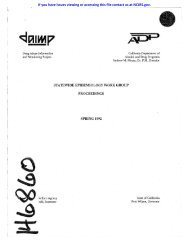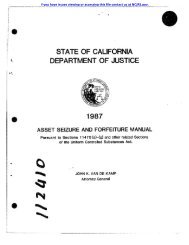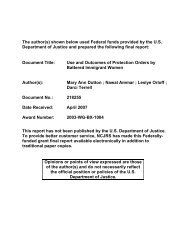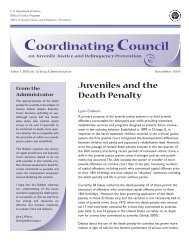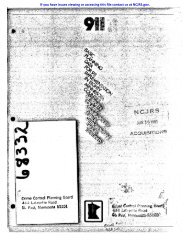Conflict Resolution Education - National Criminal Justice Reference ...
Conflict Resolution Education - National Criminal Justice Reference ...
Conflict Resolution Education - National Criminal Justice Reference ...
Create successful ePaper yourself
Turn your PDF publications into a flip-book with our unique Google optimized e-Paper software.
themselves from mainstream culture. The following<br />
section describes a conflict resolution program in a<br />
juvenile justice setting in California.<br />
The Community Board Program<br />
In 1987, with support from California’s Office of<br />
<strong>Criminal</strong> <strong>Justice</strong> Planning, the Community Board<br />
Program began to explore how the <strong>Conflict</strong> Manager<br />
(peer mediation) program might be implemented<br />
in juvenile treatment facilities, known in<br />
some jurisdictions as “ranches.” In California and<br />
other States, these county-operated facilities are<br />
the last opportunity for the rehabilitation of serious<br />
and violent juvenile offenders before they enter<br />
the Youth Authority, the juvenile equivalent of<br />
the adult prison system.<br />
Over time, unresolved conflicts can affect the entire<br />
facility. They consume the time and energy of<br />
counselors, extend the sentences of wards, lower<br />
the morale of counselors and wards, and make the<br />
atmosphere tense and anxious. The <strong>Conflict</strong> Manager<br />
program helps everyone involved deal with<br />
conflict more effectively.<br />
Our wards are here in part because they<br />
have experienced conflict in their lives and<br />
did not know how to resolve it appropriately.<br />
The <strong>Conflict</strong> Manager program teaches<br />
these young men the skills to approach a<br />
conflict in a mature manner and resolve it<br />
in a socially acceptable fashion.<br />
Superintendent, Harold Holden Ranch for<br />
Boys, Morgan Hill, California<br />
The heart of a <strong>Conflict</strong> Manager program is a faceto-face<br />
meeting between the disputants in which<br />
they talk about their problems with the help of<br />
conflict managers, who are wards of these facilities<br />
selected and trained to serve as mediators for their<br />
peers. Throughout the conflict management process,<br />
the disputants are required to take responsibility for<br />
the problem and its solution. The conflict manager’s<br />
responsibility is to help the disputants communicate<br />
48<br />
more effectively and understand one another’s point<br />
of view. The disputants then come to their own<br />
agreement, one they are more likely to keep. The<br />
objectives of conflict management are to rebuild or<br />
establish a positive relationship between the disputants<br />
and gradually spread the belief in and use of<br />
peaceful and constructive conflict resolution skills<br />
throughout the facility. 2<br />
Voluntary Participation<br />
Participation in the program is voluntary. Wards<br />
may be referred by a counselor to see the conflict<br />
managers, but once there, they have the choice not<br />
to participate, with no penalty for their decision.<br />
Wards have this choice because conflict management<br />
requires the active participation of both disputants.<br />
If both are committed to finding a resolution<br />
to their problem, both will work hard to express<br />
their points of view and listen to each other. This is<br />
impossible if one party does not want to participate.<br />
Because conflict management is voluntary, it is<br />
never a replacement for disciplinary action. If wards<br />
are offered conflict management as an alternative<br />
to punishment, their motives for participating may<br />
be clouded and the process ineffective. The goal is<br />
to provide early intervention for peaceful problem<br />
solving before rules are broken or conflicts escalate.<br />
When wards break facility rules, staff take the usual<br />
disciplinary steps. Afterward, they can suggest<br />
meeting with conflict managers to express and resolve<br />
core issues and avoid further conflict. In this<br />
way, the <strong>Conflict</strong> Manager program supplements<br />
rather than replaces the regular disciplinary system.<br />
Types of Disputes Handled by <strong>Conflict</strong><br />
Managers<br />
<strong>Conflict</strong> managers are equipped to handle many of<br />
the day-to-day disputes that arise in a juvenile facility<br />
setting, such as name calling, serious “horseplay,”<br />
and conflicts over things in short supply—time at<br />
the pool table or in the weight room, a chance to<br />
watch a favorite television program, the attention<br />
of a popular counselor, or access to supplies such<br />
as toiletries.



